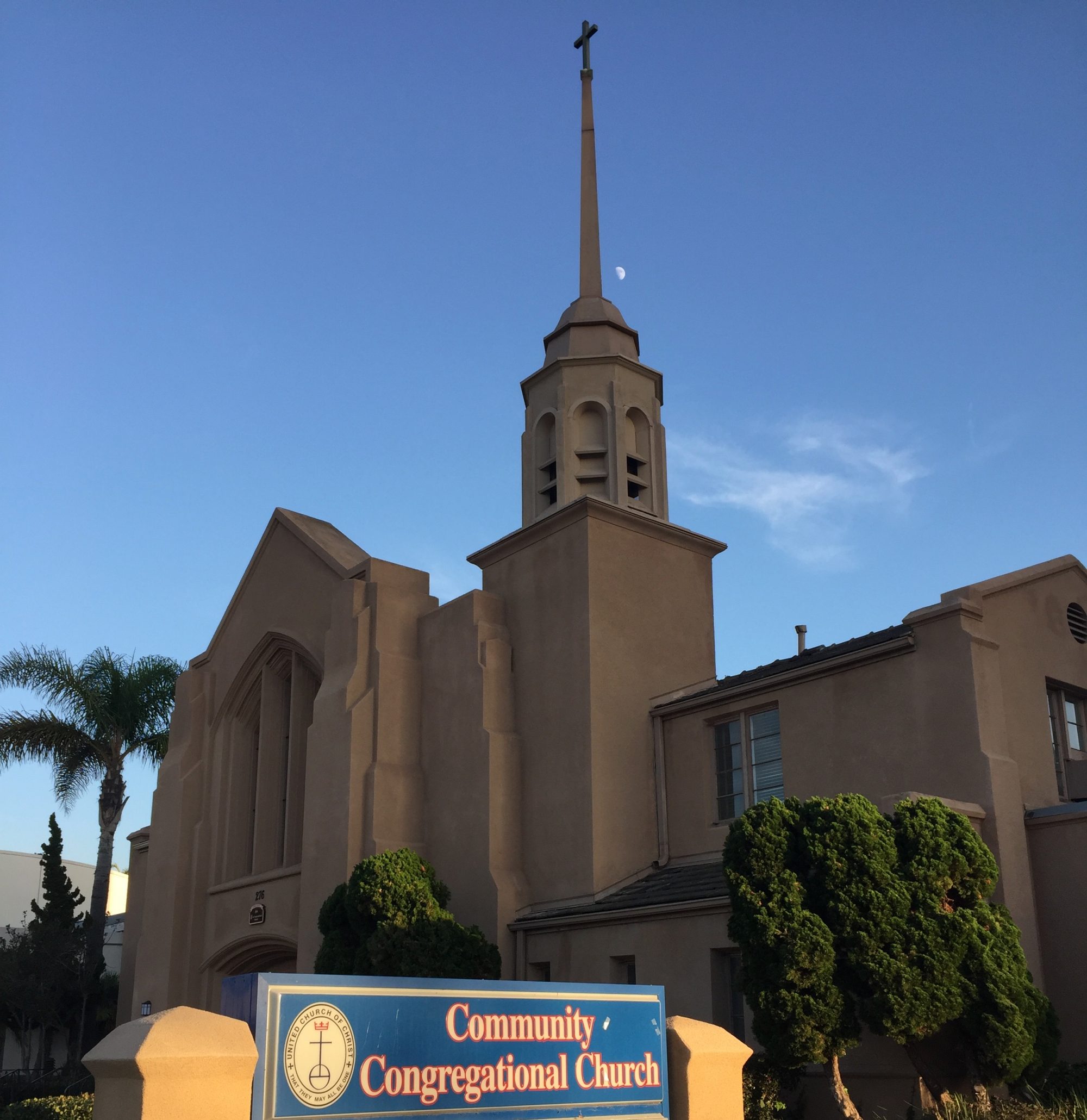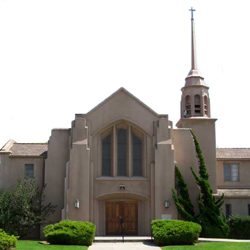“When Eyes Need Opening”
A meditation based on Luke 24:13-35
May 6, 2018
Community Congregational Church of Chula Vista
Dr. Sharon R. Graff
* * * * *
Once a year, Community Congregational Church has a rummage sale! Yesterday was the big day, and what a day it was! [slides] Wonderful volunteers, crowds of customers, tables heaped with treasures and treats! One could feel the energy in the air, and it was good energy. Energy of friendship and support…energy of acceptance and hope…energy of “out with the old, and space—now—for the new!” Up till the final moment, nearly, folks from this congregation and the community were bringing in what they saw as trash for it to be miraculously tagged and transformed into someone else’s treasure.
Friends, that process of alchemy—the transformation of one thing into something else—alchemy: that is some of the work God does best! Look what happened once, twice, many times with Jesus and his first followers after his body went missing from the tomb of death. He appeared to Mary outside the tomb and she first thought he was the gardener. He appeared to a group of his disciples behind locked doors and offered them a breath of peace. A week later, he appeared to the group again behind the locked doors of fear, this time with Thomas present, and assured them—through wounded hands and pierced side—assured them with his very body that God would be with them through any troubles. He appeared to them at the seashore and cooked them breakfast. He appeared to them in a room and ate a bite of fish. In today’s story, he appeared to them as they walked from Jerusalem to Emmaus and talked to them of scripture.
Each time, without fail, Jesus was at first unrecognizable. As we have discovered, together, over this Easter season, resurrected life looks completely different than the familiar life we once knew. And God deals in resurrected life! For resurrected life, like a good church rummage sale, is “out with the old so that there is space now for the new!” So Community Congregational has a rummage sale every year.
Scholars of religious history have noticed that God also has a big rummage sale every 500 years or so! Starting with written history several centuries before Jesus lived, we see the beginnings of this every-500-year religious phenomenon. That time period, called the Axial Age, included such new thinkers as Confucius and Lao-Tse in China; Buddha and the writing of the Upanishads in India; Zarathustra in Iran; and in Palestine the prophets Elijah, Isaiah and Jeremiah; Greece witnessed the appearance of Homer, and many philosophers including Plato; so much new thinking occurred in nearly all of the known world at that time almost simultaneously in China, India and the West. It was the first documented rummage sale of God! 500 years later, there was another with Jesus and his first disciples. 500 years after Jesus came Mohammed and the creation of Islam. 500 years later was the split in Christianity that led to the Eastern Orthodox churches, and 500 years after that was the Protestant Reformation, providing the foundation for the ancestors of our beloved United Church of Christ. Every 500 years or so, without fail, for the past almost 3,000 years of human history. “God’s Great Rummage Sale.”
That’s what scholar and writer Phyllis Tickle calls this phenomenon…God’s Great Rummage Sale. Out with the old, so there is space for the new. If you can do math, you have already figured out that we are, right now, 500 years from the Protestant Reformation…which means…we are lucky enough to live in one of these seasons where God is coordinating a massive rummage sale!
Now, that all sounds great, until you actually go behind the scenes of an actual rummage sale. There is chaos. There are differing opinions. Lots of putting things here, and having someone else move them there. Sometimes feelings get hurt simply because so much is going on that it’s hard to keep focus on what really matters. Oftentimes people who would never meet up, actually meet up. And every time, without fail, much good comes out of a rummage sale.
An actual rummage sale—in real time—is a place of change that is not always wanted. My dad loved rummage sales, yard sales, he even sold 4×8 sheets of plywood out of our family’s garage just because he loved to connect stuff with people who needed that stuff. He loved the stories that accompanied the treasures. And he loved sharing those stories with the new conservator of that treasure. One time, after Mom and Dad could no longer drive, they still wanted to participate in their church’s rummage sale. So we worked together to collect a carload of stuff and I dropped it off at the church. A day or so later, Dad called me and asked if I’d take him back to the church for the rummage sale…yes, he wanted to buy back some of his own treasures!
When we are in a season of change, old stuff moves back and forth between the categories of “trash” and “treasure”—and we, ourselves, may be undecided as to whether it stays or goes. This is especially true for big seasons of change—the every 500 years or so rummage sale—such as the church is in now. Personally, I think this current rummage sale of God’s has been going on since about 1980…I think it started about the time the churches like this one began their decline. We know, intuitively, that the church of the 1950s is no longer alive. We can see that the so-called mega-churches are little more than spiritual revolving doors, meeting the needs of an individual for a decade or two at most. We hear, with some dismay, that the fastest growing group of “believers” is now the “Nones.” You know, on forms when we are asked to check a box for our spirituality—Christian, Buddhist, Muslim, Native American, Bahai, Hindu, etc., there is always a box marked “None of the above.” For the first time in history, that box is growing faster than any of the others. As strange as it may sound, I am not at all disheartened by this reality because my faith is not in the church as an institution. My faith is in Christ and in God and in Spirit, and Spirit is doing a new thing all around us.
Look back over nearly 3,000 years of religious and spiritual activity. Every time, without fail, God’s great rummage sales have netted something new, some more relevant carrier of the message that God really, truly loves us humans just the way we are. God is batting 1,000 on this!
Interesting and important to notice: when God has a rummage sale, the old isn’t completely gone. That is maybe where the rummage sale metaphor breaks down a bit. The old continues, but in a new and different form, affected by the new. God’s Great Rummage Sales, you see, leave traces of the old within the new. For in reality, new spiritual movements don’t overshadow the old. Nor do they necessarily destroy what came before. Sometimes, both live side by side. Sometimes, one goes underground and resurfaces centuries later. With God, it is not a matter of either/or, but both—and.
And so, I find the thought that we are living through another of God’s Great Rummage Sales to be deeply comforting as we maneuver these current chaotic spiritual waters. Yes, the church as we know it is changing form. Yes, the church of our childhood is no longer as vibrant as in our memories. Yes, we have the good fortune to be living through a time of one of God’s Great Rummage Sales, and yes, God’s got this. Spirit’s got this. The resurrected Christ has definitely got this.
Just like those earliest followers of Jesus, we may not recognize his presence with us…until…he takes the bread and blesses it and breaks it and gives it to each of us with his own breath breathing peace into our troubled souls. And then our eyes are opened, and we begin to see the new thing we’ve been hearing about…springing from this broken bread…feeding us…nourishing us…giving us new eyes to see God’s hope through our own. Do you see? Can you hear? There is a “trash-to-treasure” kind of transformation happening all around us…may it also happen within us as we eat here with ever opening eyes.
Amen and Blessed Be

